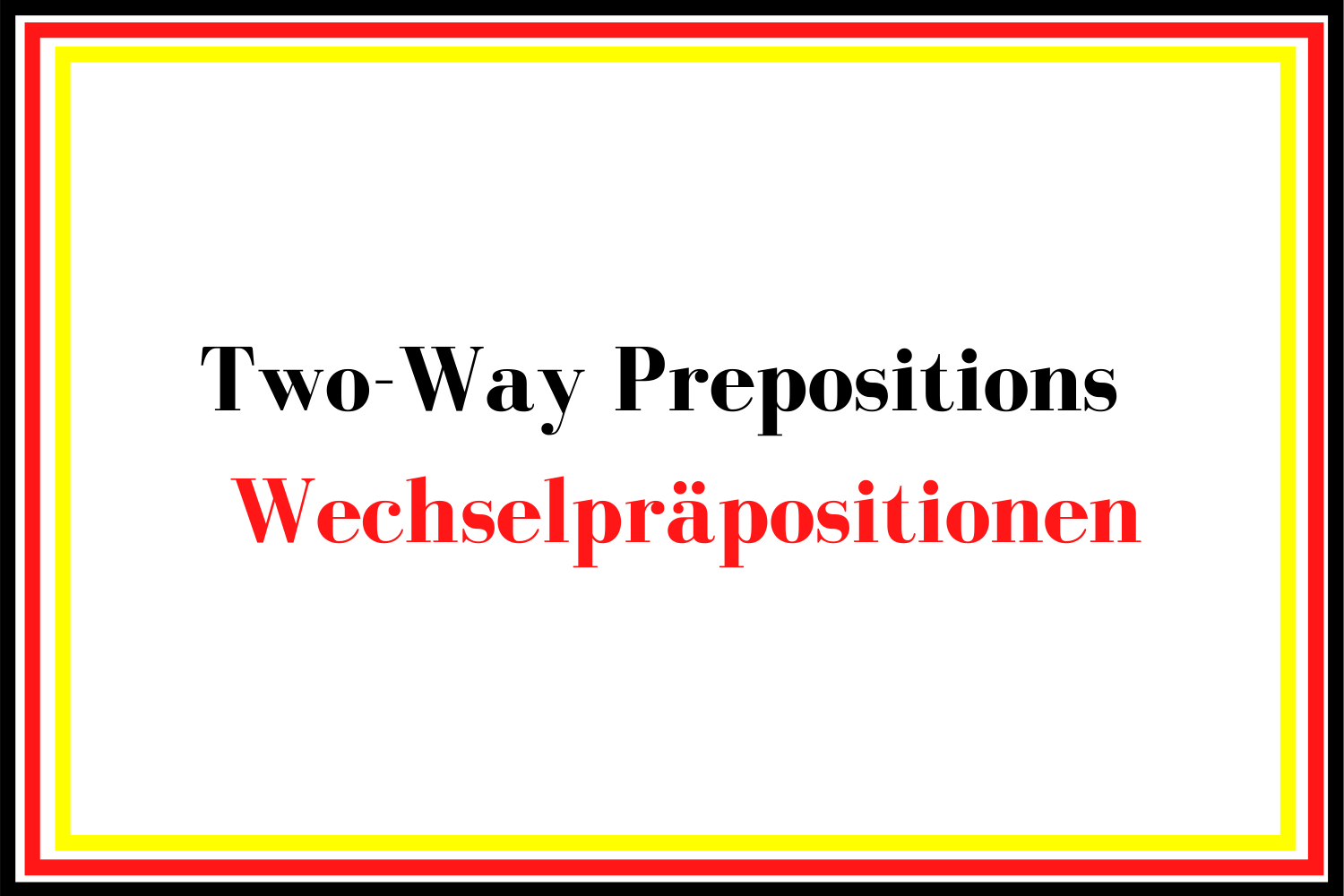German Two-Way Prepositions – Wechselpräpositionen – Deutsche Präpositionen lernen
Cases: German Two-Way Prepositions
The two-way prepositions can take either the accusative or the dative case. They take the accusative when they describe movement from one place to another. They take the dative when there is either no movement, or when the movement remains within one place:
German Two-Way Prepositions – Wechselpräpositionen – Deutsche Präpositionen lernen
| Akkusativ | Dativ |
| Der Mann musste zuerst auf die Mauer klettern. | Er saß eine Weile auf der Mauer, und guckte herum. |
| The man first had to climb onto the wall. | He sat for a while on the wall, and looked around. |
| Der Mann kletterte in den Garten der Hexe und hat einige Rapunzeln gestohlen. | In dem Garten fand er nicht nur die Rapunzeln, sondern auch die böse Hexe! |
| The man climbed into the garden of the witch and stole a few lamb’s lettuce. | In the garden he found not only the lettuce but also the angry witch! |
| Die Hexe nahm seine Tochter weg, um ihn zu bestrafen, und sperrte sie in einen Turm. | Das kleine Mädchen war sehr traurig und einsam in dem Turm! |
| The witch took his daughter away to punish him, and locked her into a tower. | The little girl was very sad and lonely in the tower. |
| Der junge Königssohn verliebte sich in Rapunzel und stieg auf sein Pferd und ritt zum Turm, um Rapunzel zu retten. | Der Prinz sitzt auf seinem Pferd und singt Rapunzel ein Lied: ‘Rapunzel, Rapunzel, lass dein Haar herunter!’ |
| The young prince fell in love with Rapunzel and climbed on his horse and rode to the tower in order to save Rapunzel. | The prince is sitting on his horse and sings Rapunzel a song: Rapunzel, Rapunzel, let down your hair to me!’ |
| Er ruft Rapunzel an das Fenster. | Aber leider steht statt Rapunzel die böse Hexe an dem Fenster! Der arme Prinz! |
| He calls Rapunzel to the window. | But unfortunately, instead of Rapunzel, the evil witch is standing at the window! Poor prince! |
an and in can be combined with the (masculine and neutral) articles that follow them:
| Neuter accusative | Masculine/neuter dative | |||||
| an + das | => | ans | an + dem | => | am | |
| in + das | => | ins | in + dem | => | im | |
| Die arme Rapunzel lebt in dem Turm. | => | Die arme Rapunzel lebt im Turm. | ||||
| Er ruft Rapunzel an das Fenster. | => | Er ruft Rapunzel ans Fenster. | ||||
| Leider steht die Hexe an dem Fenster. | => | Leider steht die Hexe am Fenster. | ||||
German Two-Way Prepositions – Wechselpräpositionen – Deutsche Präpositionen lernen
| an, an +
vorbei |
at, next to (with contact), come (up) to | Der Vater steht an der Mauer des Gartens. Er kommt an einem großen Baum vorbei. | The father stands at the wall of the garden. He comes to a large tree. |
| auf | on top of (with contact), onto | Er klettert auf den Baum. | He climbs onto the tree. |
| in | in, inside | Er springt in den Garten. | He jumps into the garden. |
| hinter | behind | Die Rapunzeln sind hinter den Karotten. | The lamb’s lettuce is behind the carrots. |
| neben | next to (touching or not) | Er kniet neben den Rapunzeln. | He is kneeling next to the lamb’s lettuce. |
| über | above (not touching), across (e.g., street) | Die Hexe steht drohend über dem Vater. | The witch is standing threateningly above the father. |
| unter | below, under | Der Vater läuft unter den Bäumen nach Hause. | The father runs home under the trees. |
| vor | in front of, before, because of/with (+ no article) | Er steht vor der Tür und zittert vor Angst. | He stands in front of the door and shakes with fear. |
| zwischen | between, in between | Zwischen den Bäumen sieht er die Hexe; sie kommt näher und er beginnt zu weinen. | Between the trees he sees the witch; she comes closer and he begins to cry. |
Just to review, here are the definite, indefinite and negative articles in the accusative and dative cases:
Accusative articles
| the | a/an | none | ||
| masculine | den Mann | einen Mann | keinen Mann | (man) |
| feminine | die Hexe | eine Hexe | keine Hexe | (witch) |
| neuter | das Mädchen | ein Mädchen | kein Mädchen | (girl) |
| plural | die Kinder | Kinder | keine Kinder | (children) |
Dative articles
| the | a/an | none | ||
| masculine | dem Mann | einem Mann | keinem Mann | (man) |
| feminine | der Hexe | einer Hexe | keiner Hexe | (witch) |
| neuter | dem Mädchen | einem Mädchen | keinem Mädchen | (girl) |
| plural | den Kindern | Kindern | keinen Kindern | (children) |
German Two-Way Prepositions – Wechselpräpositionen – Deutsche Präpositionen lernen

